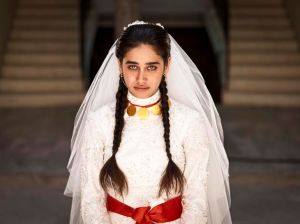Interview with the Director Nina Maria Paschalidou about her documentary KISMET
What is so fascinating about this story?
When you first watch Turkish Soap operas, or any soap operas, you cannot imagine that they can actually affect women in this way. But there are many levels to a story and one has to be open to see them. Especially when you are filming a documentary, I believe that the secret is to see beyond the obvious elements in a story and dig deeper.
How did you approach casting for your main characters?
We conducted a lot of pre-production and we spent months in Egypt and Turkey, locating our mail characters and also obtaining access to the industry and Turkish actors. We actually found many women whose lives have been affected by watching the series. Especially in Egypt, we met women, who don’ t have Egyptian role models any more, especially after the failure of the Arab Spring, they don’t even have hope in finding role models any more. This is why Turkish women, presenting a modern type of Muslim women, who are fighting for what they want and are getting it appear inspiring. In finding characters we also had a lot of help from our co-producers in the United Arab Emirates, in Bulgaria and Croatia.
What do these women have in common and what makes them different?
What these women have in common is the need for love, respect and happiness. I know it sounds cliché, but these are very common for women around the world. So the struggle for women’ s rights is common, and it spreads from the Arab World to the Balkans to the West. Look at what is happening in Spain right now on the issue of abortions. The fight never ends even in parts of the world we consider to be modern. On the other hand, we must not forget that each country has its unique characteristics. And so do the women in these countries. What divorce means to one woman is not the same to what it means for another. One can see this difference in the film, in the story of Samar, who is inspired by the series Fatmagul and breaks her marriage after 13 years of suppression and violence. It is not the same to divorce in Abu Dhabi, as it is Athens. Traditions are also very different and one has to always consider them when studying or filming women. But it is all these that make women magnificent to film, I find that women characters are complicated, and fascinating at the same time, and very intriguing to follow in a film. Being a woman also helped very much with gaining access to these women’ s lives. There are some things that a woman only tells a woman.

What was the challenge for you telling this story?
The challenge was to be sincere. And this is the challenge in every documentary. Not to fall into your own premonitions, prejudice, and to follow the story where it takes you. And I am insisting on this, because so far in Greece, the only approach to Turkish Soap operas, was negative, and they are considered Turkey’s cultural weapon.
How did you change after finishing this film?
I think I have a better understanding of myself as a woman, and also I have learned to never ignore something that can be considered “cheap” in some people’s dictionary. Even soap operas can be useful in society, and I don’ t believe in those who snob them, because I think that these are the very same people who secretly watch them when no one is around.
What is success for you?
Success is to do what you love the most. Creating documentary films is what I love, but my prime need for this comes from my wish to understand the world. Maybe this is a method to understand myself, as well as humanity. It is a lonely process, sometimes you lose yourself in the lives of others, but it is worth it.